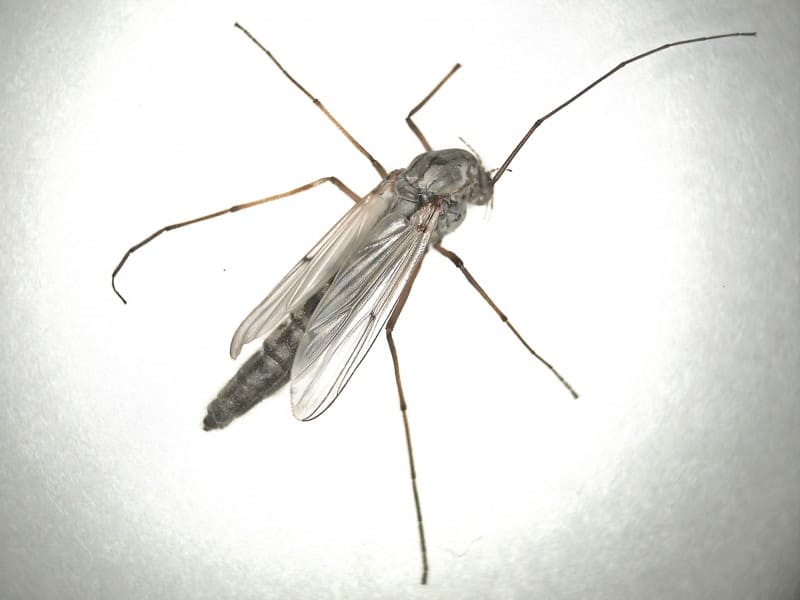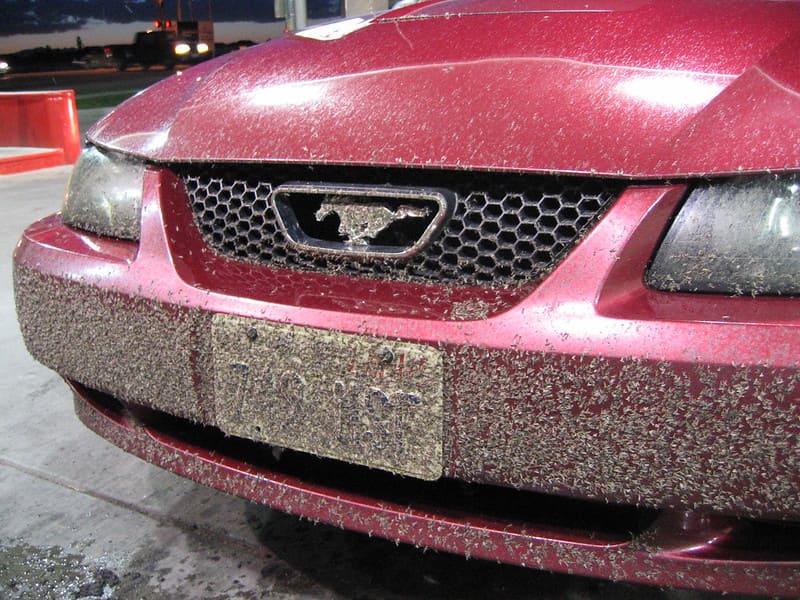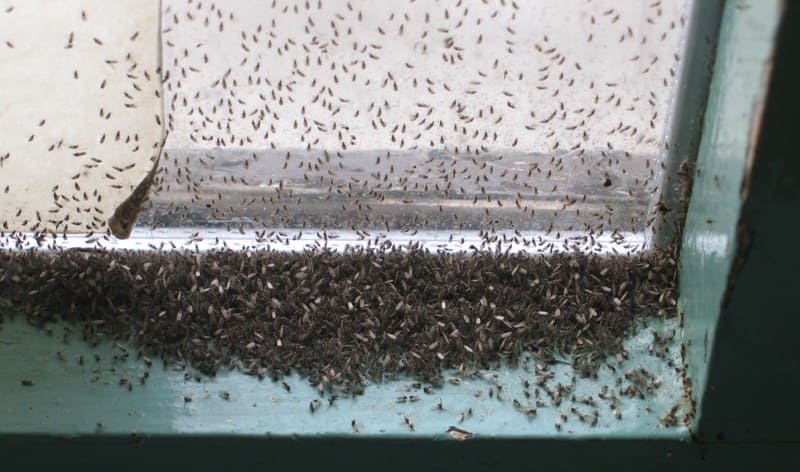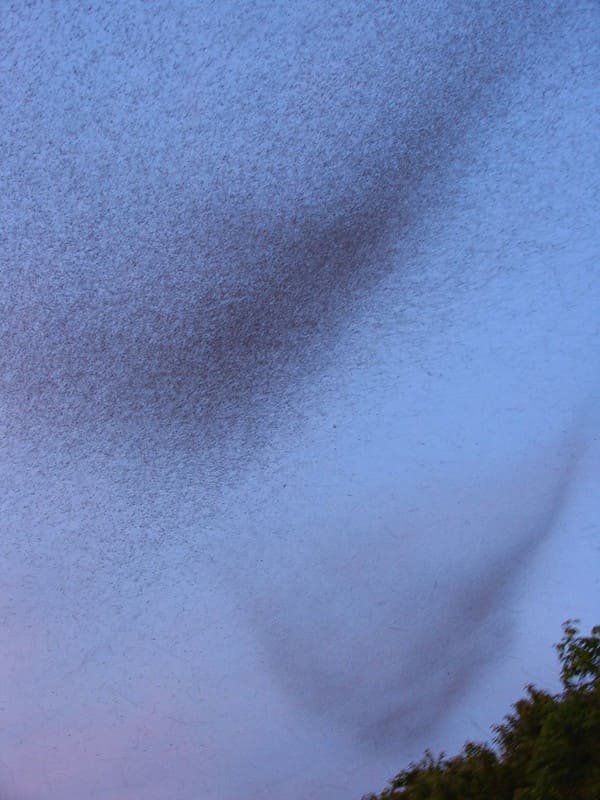Understanding Blind Mosquitoes: An Overview
Blind mosquitoes commonly known as aquatic midges (muffleheads bug or muckleheads), are no biting insects that are common nuisance pests in many areas especially near freshwater. Little known to their name, these muffleheads bugs are not mosquitoes nor do they bite or bear any infections. Large clouds can be seen at dusk and dawn because of the hordes created by swarming, and this often causes discomfort as well as damages to properties.
What are Blind Mosquitoes? | Midges or muffleheads or muckleheads
Blind mosquitoes are members of the family Chironomidae and are known in simple terms as aquatic midges. They are freshwater living insects living in lakes, ponds and rivers. Their life has several stages: egg, larva, pupa, and adult. A single adult female midge only survives for a few days and performs all reproductive behavior within the water’s edge to lay a batch of fertilized eggs.

Image Credit: Wikimedia Commons
Characteristics of Blind mosquitoes
- Appearance: The mosquitoes are small animals with an average size ranging from 1-10 mm in length. Their cylindrical shape also varies but slender and fleshy in color.
- Behavior: Blind mosquitoes are known to have an affinity towards lights making them zoom in around outdoor bulb lamps and other light colours of surfaces.
- Habitat: They are present and breed in stagnant or slow moving water with organic material.
Life cycle of Blind mosquitoes (Midges or Muffleheads bug)
- The Egg Stage: The water or moist depicting the female mosquitoes laying their eggs.
- The Larval Stage: Organic material at the bottom of any water body would transform into larvae.
- The Pupal Stage: The larvae after a few molts develop into pupae.
- The Adult Stage: There, the midges emerge as adults and start the whole process afresh.
Blind mosquito season
The blind mosquito season extends from the months of April to November. During this time, these insects multiply in places with moisture and can swarm in great numbers (Blind mosquito swarm), which is a nuisance during activities done outdoors. Drought-stricken areas may have a lower population of blind mosquitoes (midges) as they rely on moist areas for reproduction.
Why are blind mosquitoes a problem?
As blind mosquitoes do not bite or contribute to the spread of diseases, they still can be problematic in regard to;
- Disruptive Behavior: Their tendency to swarm can be very annoying in outdoor recreational activities.
- Clogged surfaces: Midge bodies easily pile up, creating unattractive heaps that darken wooden and cloth surfaces.
- Type of allergy: Walking / Living in an area infested with these kinds of insects can cause allergic reactions to some individuals.

Image Credit: Michael Righi (Flickr)

Image Credit: Flickr
How to get rid of blind mosquitoes?
There are two specific methods that can be utilized in the process of dealing with blind mosquitoes and these methods include prevention and control which will definitely help to keep blind mosquitoes away. Here are some effective strategies:
1. Reduce breeding sites
- Eliminate Standing Water: Since blind mosquitoes breed in still water, it is essential to remove water sources that form pools around your home. This may include rain collecting empty storage containers and natural practices that would keep stagnant water at bay.
- Tackle the Organic Debris: The midge larvae’s food sources can be minimized by eliminating the organic matter present in ponds or lakes.
2. Time management strategies for lighting
- Turn Off Outdoor Lights: The blind mosquito is attracted to light; thus, outdoor lighting should be switched off for some periods specially during peak hours.
- Use Yellow Lights: If outdoor lights are extremely a requirement, use yellow or sodium vapor lights that are the least attractive to insects.
3. Implement Physical Barriers
- Install Screens: Protect doors and windows with fine mesh so midges cannot get into houses.
- Close all Entry Points: Keep the windows and doors closed (including any other entry points) during midges high occurrence periods; these comprise of dusk and dawn.
4. Biological Control Approaches
- Introduce Insectivorous Fish: Ensuring that midge larvae eating fish are present in ponds can be helpful in naturally controlling the midge populations.
- Aquatic Plants: Introducing specific aquatic plants can enhance water quality and diminish midge breeding.
5. Chemical Control Options
The chemical methods should ideally be the last resort due to the potential and harmful effects leading to pollution; still there are some options:
- IGR (Insect Growth Regulators): These chemicals prevents and halt the development and growth of midge larvae and makes sure the larvae doesn’t complete their stages and mature to adults, when applied correctly.
- Larvicides: Insecticides targeting midge larvae would help in reducing populations, but these should be applied with caution and a specific purpose so as not to destroy other useful species in the ecosystem.
6. Trapping Techniques
- Light Traps: Setting light traps outside or outdoor spaces, can attract midges and destroy them before they come into a house.
- Electrocutor Traps: These traps destroy flying insects through electric grids but can be costly as several traps may be needed to be effective.
Blind mosquito control – Methods and Treatments
Blind mosquito treatment: Natural methods
If you prefer to get rid of blind mosquitoes using natural methods, you may opt to use the following:
1. Essential Oils
There are wide varieties of essential oils which have an odor that deters blind mosquitoes:
- Lavender Oil
- Tea Tree Oil
- Eucalyptus Oil
Pour carrier oils into these oils in order for them to be applied onto the skin or use the oils in diffusers placed around the house.
2. Garlic Spray
Garlic has been known to keep a number of insects away:
- Smash some garlic pods.
- Place them into water and heat them for half an hour.
- Filter this solution and spray it in your house.
3. Coffee Grounds
Coffee grounds can be utilized in standing water to displace oxygen and thus suffocate the midge larvae:
- Scatter coffee grounds onto places with stagnant water.
4. Camphor
The pungent odor of camphor is a surefire way of keeping mosquitoes at bay:
- Camphor tablets should be burn in closed spaces or place them in a bowl of water around the house.
What kills blind mosquitoes? | Methods to Control blind Mosquito infestation
Here’s a list of items and methods that can effectively kill or control blind mosquitoes (aquatic midges):
1. Chemical Control Agents
- Bacillus Thuringiensis Israelensis (BTI): This biological insecticide specifically targets the midge larvae when consumed.
- Methoprene (Altosid®): This growth inhibitory, insect growth regulator (IGR) prevents adult development of larvae.
- Temephos (Abate®): An organophosphate larvicide that targets midges larvae in water.
- Lambda-cyhalothrin (Demand CS®): A synthetic pyrethroid used as barrier treatments against adult midges.
- Deltamethrin (Suspend®): Another synthetic pyrethroid effective in killing adult midges.
- Bifenthrin (TalstarOne®): Used for residual applications to control adult populations.
- Cyfluthrin (Tempo®): A pyrethroid insecticide suitable for treating areas where midges rest.
2. Physical and Mechanical Control Methods
- Light Traps: Devices that attract and trap adult midges using bright lights.
- Surface Oils: A thin film of oil can be applied to water surfaces to suffocate larvae by breaking the surface tension.
3. Biological Control Methods
- Insectivorous Fish: Introducing fish species that feed on midge larvae can help control populations naturally.
4. Environmental Management
- Algaecides: To restrict algae in the water bodies since their presence would enhance the food chain for midge larvae.
- Nutrient Management: The prevention of fertilizer runoff into waterways can assist in the reduction of the available midge breeding areas.
These methods can be used individually or in combination to effectively manage blind mosquito populations in various environments.
Blind mosquito swarm: What attracts blind mosquitoes?
Also known as aquatic midges, blind mosquitoes have a strong affinity for light whereby artificial light becomes one of their most attractive qualities. Porch lamps, street lights, and windows, particularly outdoor ones, are better sources of such lights and sometimes cause blind mosquito swarming in residential areas at sunset or sunrise.

Image Credit: Mark K. (Flickr)
What is more, these insects are attracted to light-colored surfaces because they are more visible especially against dark backgrounds. Other natural attractants to blind mosquitoes and other types of midges include carbon dioxide released from the respiratory effects of human and animal bodies and some specific odors from sweat or skin compounds. The human body’s warmth also acts as an additional magnet for these creatures making outdoor gatherings a risky exposure to midge swarms.
Furthermore, they are drawn to relatively stagnant or slow moving water that is rich in organic substance for midge mosquitoes reproduction. Stagnation along with rich nutrients in the water provide ideal breeding grounds for their larvae hence the abundance in areas with large vegetations or algae.
Knowledge and appreciation of these attractants to blind mosquitoes is essential for attempting strategies such as limiting outdoor lighting and controlling standing water around houses. These and many other attempts can really help the homeowners contain the problem of blind mosquitoes and allow enthusiasts to use the outdoors freely.
Homemade blind mosquito repellent and sprays
Preparation methods for Blind mosquito repellent, Blind mosquito spray
DIY Preparation Method #1: When you want to create a blind mosquito repellent, you can make use of a basic combination of natural ingredients that are known to have some repellent capability. One common way is to combine 30 drops of lemon eucalyptus oil with 4 ounces of witch hazel or vodka in a spray bottle. This solution can be sprayed on exposed parts of the skin and clothing to avoid contact with blind mosquitoes.
DIY Preparation Method #2: You can prepare a homemade repellent by pouring into a correctly sized spray bottle, half vinegar or apple cider vinegar, half water, and a few drops of clove, rosemary, or geranium essential oils. Shake the mixture vigorously and spray it onto the skin and clothes.
DIY Preparation Method #3: From essential oils, a homemade blind mosquito spray can be made. In a bottle containing 2 ounces of distilled water, blend 10 drops of lavender oil, 10 drops of peppermint oil, and 10 drops of Tea Tree oil lastly. Before utilizing it, it should be shaken well and sprayed around places like dining tables where it is likely for blind mosquitoes to congregate.
Natural Organic Commercial Products: But then again homemade alternatives are effective but these are some of the natural mosquito repellents that are available commercially:
- Badger Anti-Bug Balm
- EcoSMART Organic Insect Repellent
- Maine Coast Organic Bug Spray
Chemical Based Commercial Products: Popular commercially prepared repellents are also known to contain some active ingredients such as DEET, picaridin, oil of lemon eucalyptus. These substances have been evaluated in the laboratory with a number of species, including blind mosquitoes.
In most commercial sprays, the active ingredients include permethrin, which is effective against adult and even blind mosquitoes. In addition to that, certain sprays could have plant-based compounds like citronella oil which would help during masking human scents responsible for attracting the insects.
In this modern world, there are several repelling products available commercially that has been incorporated with recommendations for midges or blind mosquito repelling. Some common ones include:
- OFF! Deep Woods (DEET)
- Repel 100 Insect Repellent (98.11% DEET)
- Cutter Lemon Eucalyptus Insect Repellent (oil of lemon eucalyptus)
The following repellents/sprays are the most commonly used against mosquitoes as well as aquatic midges:
- Thermacell Mosquito Repellent Patio Shield
- Sawyer Premium Insect Repellent
- Buzz Away Extreme
Such solutions and products allow not only locating effective solutions to repel blind mosquitoes using homemade remedies but with commercially available alternatives as well.
Blind mosquitoes in Florida (Muffleheads bug infestation)
A thoughtful insect invasion was witnessed in Florida in the latter half of 2005 popularly known as aquatic midges or blind mosquitoes. This blind mosquito season in Florida is basically from April to November which coincides with the rising temperatures and as lake and pond water levels begin to drop. Aiding this phenomenon and presence of blind mosquitos, which are non-biting insects, armies of these bugs often swarm in areas which are around the water, making it frustrating for people residing there or those who are enjoying outdoor activities.
Florida blind mosquitoes prefer environment which is around lakes, rivers, and even artificial ponds, due to their high humidity levels. The blind mosquito season in Florida is marked by the presence of these mosquitoes from April till November and observes a trend of high presence of these insect bust mostly at dusk and dawn.
Biting or carrying disease is impossible for them, however, their numbers alone can be a nuisance and even damage property. Effective management plans would need to be put into action, especially in the peak season, such as controlling standing-water and using the light to direct them away from residences.
Conclusion
It is true that blind mosquitoes may not be able to bite, hence, do not present a serious health risk as their biting counterparts, nevertheless, they can spoil outdoor recreation and properties’ which is of great concern. By using a set of combined preventative approaches, light control measures, biological methods of control, and natural treatments, their numbers can be kept at bay around the home.
From the knowledge of biology and the behavior of blind mosquitoes comes the best approach in combating these parasitic creatures. With a little foresight and continual activity, it is possible to rid outdoor areas of these pests, in a manner which is healthy for both people and other animals.
📰 Must Read,
✔️ Why are There so Many Mosquitoes All of a Sudden?
✔️ How to Keep Mosquitoes Away from Patio and Porch while Sitting Outside?
Frequently Asked Questions (FAQs)
-
Are blind mosquitoes really blind?
Blind mosquitoes are not perfectly blind, and actually possess compound eyes. Their vision is hazy compared to human’s eyesight but still serves the purpose of recognizing movements and light when searching for hosts and breeding locations. However, their identity notwithstanding, these insects can see which allows them some help in moving around much more than what can be expected.
-
Are mosquitoes color blind?
Mosquitoes do not have color blindness, they are able to see colors, but only specific wavelengths of colors appeal to them the most. Some studies suggest that they prefer the darker reds and blacks that would be more like a potential source. That particular sight, together with other stimuli, such as carbon dioxide and heat from the body, is employed to find feeding targets.
-
Do blind mosquitoes bite?
Known to most people as aquatic midges or California midges, blind mosquitoes do not bite. In comparison to other mosquitoes, the female blind mosquitoes do not swallow blood nor do they transmit viruses. To the most extent, their annoyance comes due to their huge swarms that can be frustrating with outdoor events especially during the hottest months from April to November.
-
How long do blind mosquitoes live?
The average life cycle of blind mosquitoes, also known as aquatic midges, is rather short. The males emerge as adults and breed within 6 to 7 days. The females seem to have a longer lifespan of up to about 5 months in the best situations but their average life span is estimated to be approximately 6 weeks. On the other hand, a significant proportion of the adults do not live long after the pupae stage due to their high mortality rates.
-
How can I prevent blind mosquitoes from swarming in my yard?
In your case, the only way to avoid blind mosquitoes swarm in your garden would be to prevent standing water and removing the sources of the organic debris in the ponds and lakes. However, the use of light traps would be effective in preventing them from your living areas. You can also get rid of outside lights during the night. In addition, yellow lights would be better than white lights in preventing swarm of blind mosquitoes around your home.

